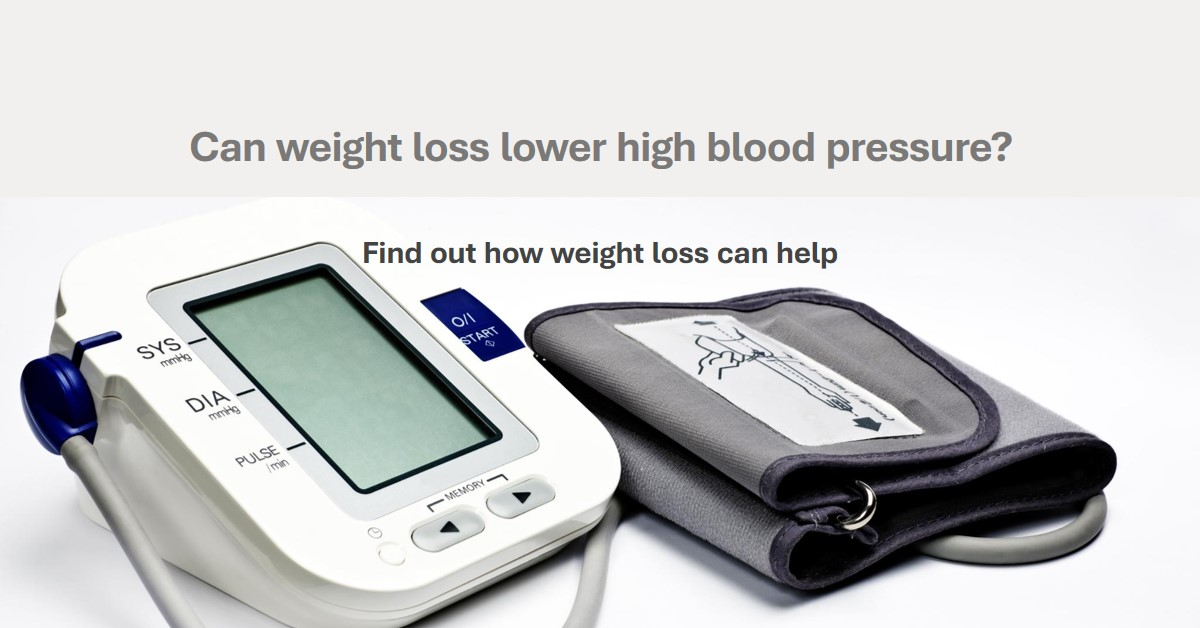Blood pressure is a crucial measure of our overall health, and it is influenced by a variety of factors such as genetics, diet, and lifestyle.
One of the most significant contributors to high blood pressure is excess weight or obesity. It is a well-known fact that being overweight or obese puts you at a higher risk for a range of health issues, including hypertension or high blood pressure.
However, the good news is that a simple change in your diet and lifestyle can significantly impact your blood pressure readings.
In this blog post, we will explore the relationship between weight loss and blood pressure and how much weight loss can lower blood pressure.
First, let's understand what blood pressure is and why it is essential to keep it in check. Blood pressure is the force exerted by the blood against the walls of the blood vessels. It is measured in two numbers, systolic and diastolic, which represent the pressure when the heart contracts (systolic) and when it relaxes (diastolic).
A normal blood pressure reading is below 120/80 mmHg, while anything above 140/90 mmHg is considered high blood pressure. High blood pressure puts a strain on the heart and blood vessels, increasing the risk of heart disease, stroke, and other health problems.
Now, let's look at how weight loss can impact blood pressure. When we carry excess weight, our heart has to work harder to pump blood throughout the body, leading to increased blood pressure.
Losing even a small amount of weight can help reduce this strain on the heart, leading to a decrease in blood pressure.
Recommended: The Ultimate Weight Loss Guide: Insider Tips and Expert Answers
According to research, for every pound of weight lost, there is a decrease of around 1mmHg in both systolic and diastolic blood pressure. This may not seem like much, but even a small reduction in blood pressure can have significant health benefits.
The amount of weight loss required to lower blood pressure can vary from person to person. Generally, a weight loss of 5-10% of your total body weight can lead to a significant decrease in blood pressure.
For example, if you weigh 200 pounds, losing 10-20 pounds can lower your blood pressure by around 5-10mmHg. However, it is essential to note that these numbers are not set in stone and can vary depending on your age, gender, and overall health.
The type of weight loss also plays a significant role in its impact on blood pressure. For instance, losing weight through crash diets or unhealthy methods can lead to a temporary decrease in blood pressure, but it is not sustainable and can even be harmful to your health.
On the other hand, losing weight through a healthy, balanced diet and regular exercise has a more long-term and sustainable effect on blood pressure. Additionally, incorporating stress-reducing activities such as yoga or meditation can also aid in lowering blood pressure.
In conclusion, weight loss can have a positive impact on blood pressure, and even a small amount of weight loss can lead to a significant decrease in blood pressure. However, it is essential to focus on making healthy lifestyle changes rather than achieving a specific number on the scale.
A healthy, balanced diet and regular exercise can not only help in weight loss but also improve overall health and well-being. Consult with your doctor to determine a healthy weight loss plan that works for you and monitor your blood pressure regularly to track its progress.
Your Weight Loss FAQs Answered: Expert Insights for Effective Results
When weight loss is a concern: When should you worry?
Will weight loss lower blood pressure?
Will weight loss lower blood sugar?
How much does blood pressure go down with weight loss?
Will weight loss lower cholesterol?
Will weight loss help knee pain?
Will weight loss cure sleep apnea?
Will weight loss help sciatica?
How Much Weight Loss Per Week is Healthy?
Why Weight Loss is Hard? Here are the Common Reasons You’re Not Losing Weight
For Weight Loss How Much Protein is Needed?
Medi Weight Loss: What are the Pros and Cons of Weight Loss Drugs?
Can weight loss reverse high blood pressure?
Is Weight Loss a Sign of Diabetes?
Is Weight Loss Surgery Worth it? Pros and Cons
No Weight Loss on Keto? Here are the Reasons You’re Not Losing Weight on Keto
Can Weight Loss Cause Hair Loss?
Can Weight Loss Cause Back Pain?
Can Weight Loss Reverse Hypothyroidism?
Can Weight Loss Reverse Heart Failure?
bloodpressure weightloss healthbenefits hypertension cardiovascularhealth weightmanagement bodymassindex obesity lifestylechanges exercise diet healthyhabits riskreduction medicationreduction long-termeffects healthyweight weightreduction bloodpressurecontrol weight-relatedhealthissues healthyliving healthyheart weightlossjourney bloodpressurelevels weightlossstrategies weightlossgoals healthylifestyle


